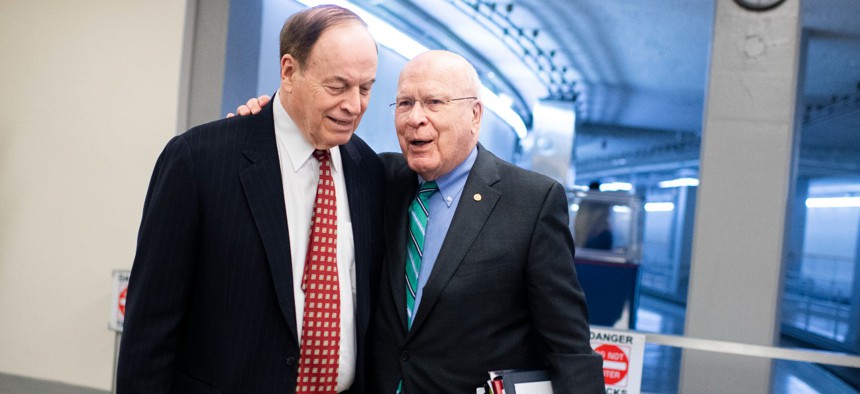
Sens. Patrick Leahy, D-Vt., right, and Richard Shelby, R-Ala., leaders of the Senate Appropriations Committee, announced the framework Tuesday evening along with the chairwoman of the House Appropriations Committee. Tom Williams/CQ-Roll Call, Inc via Getty Images file photo
Lawmakers Announce Bipartisan Breakthrough on Full-Year Omnibus Spending Bill
Several hurdles still remain before the deal is done, including actually writing the funding measures.
Top negotiators reached a bipartisan framework agreement for a full-year funding measure for the remainder of fiscal 2023, finally clearing a major hurdle that had threatened extended stopgap measures or a government shutdown.
Lawmakers must still negotiate the details of the bill to set line-by-line funding for every agency in government, but the deal allows appropriators to begin writing the measure in a bipartisan fashion. Congress is still expected to pass a one-week continuing resolution to avoid a shutdown late Friday and give the negotiators until Dec. 23 to draft and pass the final agreement. Sens. Patrick Leahy, D-Vt., and Richard Shelby, R-Ala., who lead the Senate Appropriations Committee, and Rep. Rosa DeLauro, D-Conn., who chairs the House panel, announced the framework Tuesday evening.
The deal “should allow us to finish an omnibus appropriations bill that can pass the House and Senate and be signed into law by the president,” Leahy said. “The pain of inflation is real, and it is being felt across the federal government and by American families right now. We cannot delay our work any further, and a two-month continuing resolution does not provide any relief.”
Prior to the announcement, appropriators had yet to settle on the top-line funding level and the breakdown for defense and domestic spending that is necessary before they could write an omnibus. The Senate this week is expected to pass the annual defense authorization bill, which would set defense spending for the year at $858 billion. That would mark about a 10% increase.
Democrats have pushed for an equal increase for non-Defense spending, but Republicans have called that a non-starter, citing the major spending the majority has passed through the reconciliation process. Senate Minority Leader Mitch McConnell, R-Ky., said Republicans would only agree to a non-defense spending increase that would bring the total price tag for the omnibus up to the level proposed by President Biden in his fiscal 2023 budget.
In his blueprint, Biden requested an increase of $56.3 billion, or 9.5%, for discretionary spending at non-defense agencies.
Lawmakers did not disclose the funding levels they agreed upon for their framework, but in recent days had said they were apart by about $26 billion. Democrats had said they would vote this week on an omnibus bill they were writing without direct Republican input, but scrapped those plans after making progress on a bipartisan deal over the weekend. Lawmakers around the Capitol this week expressed optimism a deal could be struck in time for the expected near-Christmas deadline.
Congress will now rush to pass the short-term CR this week to buy time until the omnibus is ready for a vote. The stopgap will require an expedited process in the Senate, meaning any one senator could cause a brief shutdown. DeLauro stressed there is still a significant amount of work outstanding.
“We have a framework that provides a path forward to enact an omnibus next week,” she said. “Now, the House and Senate Appropriations Committees will work around the clock to negotiate the details of final 2023 spending bills that can be supported by the House and Senate and receive President Biden’s signature.”
Shelby similarly said he and his colleagues were just beginning “the difficult work” of writing the bills that make up an omnibus and that Congress would be able to pass it in time only “if all goes well.”
Rep. Kay Granger, R-Texas, the top Republican on the House Appropriations Committee, did not offer her sign-off on the deal. House Minority Leader Kevin McCarthy, R-Calif., reportedly told his caucus this week he was a “hell no” on any omnibus bill. He had pushed McConnell to approve only a continuing resolution into January, when the Republicans would take control of the House and gain leverage in negotiations.
NEXT STORY: Biden’s Management Agenda Turns One







